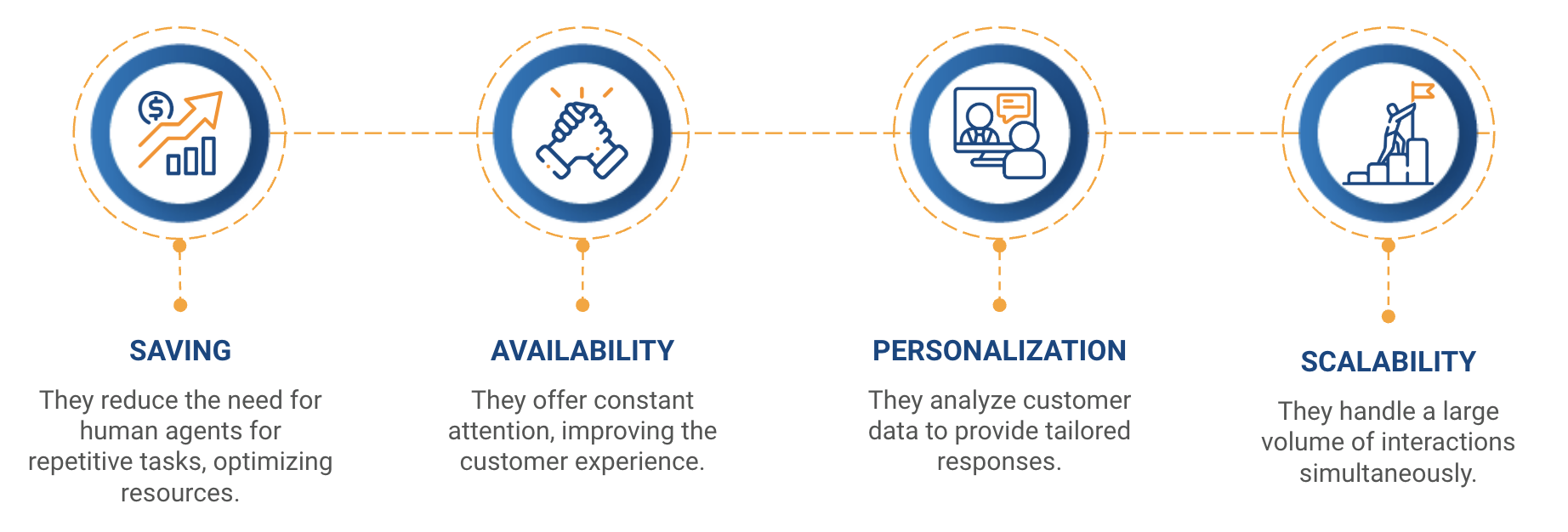
What is a chatbot solution?
December 03, 2024
Table of contents
Quick Access
We explain all the essential aspects of a chatbot.

Businesses are seeking ways to engage with their customers more efficiently, personally, and at scale. A chatbot solution represents a powerful tool to meet these needs and offer significant advantages. In this blog, we will explain what a chatbot is, how it works, its benefits, use cases, and best practices for implementation, helping business leaders make informed decisions about this technology.
What is a Chatbot?
According to AWS, a chatbot is a program or application that users can interact with via text or voice. It simulates a human conversation and is designed to answer questions automatically. These bots have evolved from simple predefined rules to advanced systems using technologies like Natural Language Processing (NLP), enabling them to understand complex queries and respond accurately.
Origins and evolution of chatbots
Chatbots first appeared in the 1960s. Initially, they relied on programmed rules, limiting their interaction capabilities. Today, thanks to Artificial Intelligence (AI) and Machine Learning, chatbots have reached a sophistication level that allows them to handle natural conversations and adapt to varied business contexts.
Why use a chatbot solution?
Benefits for Businesses
IBM highlights that chatbots allow users to quickly obtain information and resolve queries without human intervention. Key benefits include:
Cost Savings: They reduce the need for human agents in repetitive tasks, optimizing resources.
24/7 Availability: They provide constant support, enhancing customer experience.
Personalization: They analyze customer data to deliver tailored responses.
Scalability: They handle a large volume of simultaneous interactions.

Benefits for customers
From the user’s perspective, chatbots provide a quick and convenient way to get support or information. Oracle emphasizes that these tools transform FAQs into personalized interactions, offering a more human alternative to written guides.
Chatbot use cases
Customer Support
A common use case is in support services. Chatbots can resolve frequent queries, guide users through basic processes, and, when necessary, transfer complex inquiries to human agents.
Sales and Marketing
In marketing, chatbots are used to capture leads, offer personalized recommendations, and improve the shopping experience. IBM mentions that these bots help businesses understand customer engagement and purchasing patterns, leading to more effective strategies.
Internal Operations
In enterprise environments, chatbots integrate with tools like Microsoft Teams or CRMs to automate routine tasks such as password changes, inventory checks, or workflow management.
DevOps Administration
AWS highlights that chatbots can also be used in DevOps administration, helping technical teams manage complex processes more efficiently.

Best practices for implementing a chatbot solution
- Transparency: Informing customers when they are interacting with a chatbot is essential. Transparency builds trust, sets expectations, and improves acceptance of the technology.
- Effective Integrations: Connecting the chatbot with backend systems like CRM or ERP allows it to provide personalized responses based on customer history. Additionally, integrating knowledge bases improves response speed and accuracy.
- Continuous Testing: A chatbot's success depends on constant improvement. Monitoring interactions, collecting user feedback, and updating the tool to address new use cases or support additional languages are critical.
The importance of chatbots in digital transformation
Digitalization has led to a mobility-oriented society where users expect quick, personalized responses from any device. Oracle underlines that chatbots play a crucial role in this transformation by providing an accessible and cost-effective way to connect businesses and customers.
The future of chatbots in business
Chatbot technology continues to evolve. Intelligent virtual assistants powered by advanced language models are expanding their capabilities to include conversation analytics, task automation, and strategic insights generation.
With the rise of generative AI, chatbots will not only answer questions but also create content, solve complex problems, and adapt to specific business needs. This opens new possibilities for personalization and innovation.

Is your business ready to implement a chatbot?
Adopting a chatbot solution can transform how your business interacts with customers and employees. To ensure a positive impact, it is crucial to:
- Define clear goals for the chatbot.
- Choose the right technology.
- Ensure a well-planned implementation, including testing and continuous optimization.
Chatbots represent a strategic opportunity to enhance efficiency, reduce costs, and deliver exceptional experiences. If your business is considering adopting this technology, partnering with an experienced chatbot development provider could be the first step toward success.
We recommend you video
Related Blogs

What is IP Logger?
.jpg)
What is subnetting?

E-learning Developer: What you should know before hiring one

Cost of developing a custom e-learning platform
-3.17.23-p.m-1)-1).jpg)
Custom LMS development: Use cases

